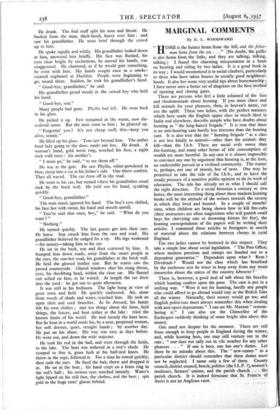MARGINAL COMMENTS
By E. L. WOODWARD
"HOME is the hunter home from the hill, and the fisher- man home from the sea . . ." (No doubt, the golfer is also home from the links, and they are talking, talking, talking.) I found this charming misquotation in a book on hunting and riding by two ladies. It is a good book in its way ; I would recommend it to social climbers, particularly to those who have taken houses in socially good neighbour- hoods. It also has some very useful tips about horsemanship ; I have never seen a better set of diagrams on the best method of opening and closing gates.
There are persons who feel a little ashamed of the fuss and rhodomontade about hunting. If you must chase and kill animals for your pleasure, then, in heaven's name, cut out the uplift. These two ladies, with the, perfect manners which have made the English upper class so much liked in India and elsewhere, describe people who have doubts about hunting as " the long-haired brigade." It is true that there is an anti-hunting cant hardly less tiresome than the hunting cant. It is also true that the " hunting brigade " as a class is not less kindly to animals—other than the animals they kill—than the l.h.b. There are social evils worse than fox-hunting, and many other forms of idle consumption of wealth are more harmful. In any case it is almost impossible to convince any one by argument that hunting is, at the least, an undesirable pursuit in a civilised community. The matter is, perhaps, not one of morals, but of taste. One may be permitted to take the side of the l.h.b., and to leave the steady pressure of a sensitive public opinion to do its work of education. The tide has already set in what I should call the right direction. To a social historian a century or two hence, the most interesting thing about these modern bunting books will be the attitude of the writers towards the society in which they lived and hunted. In a couple of months' time, when children are being shown how to kill fox-cubs (their instructors are often magistrates who will punish small boys for chivvying cats or drowning kittens for fun), the hunting correspondents of the papers will be writing their articles. I commend these articles to foreigners in search of material about the relations between classes in =al England.
The two ladies cannot be bettered in this respect. They take a simple line about social legislation. " The Post Office, where modern pensions and stamps are handed out to a dependent generation." Dependent upon what ?- Rent ? Dividends ? Would not the class which has benefited by the enclosure acts be wiser to keep away from any mean innuendos about the status of the country labourer ?
There is, however, a good deal of talk about the benefits which hunting confers upon the poor. The case is put in a striking way. " Were it not for hunting, hardly any people who could afford to go abroad would stay in the British Isles all the winter. Naturally, their money would go too, and English politicians must always remember this when dealing with anti-sport deputations." I can see Mr. Maxton " remem- bering it." I can also see the Chancellor of the Exchequer suddenly thinking of some bright idea about this money.
One need not despair for the moment. There are still foxes enough to keep people in England during the winter, and, while hunting lasts, one may still venture out in the rain ; " one- does not sally out in vile weather for any .other pleasure . . . " If one is here, one has one's duties. Let there be no mistake about this. The " new-corner " to a particular district should remember that these duties must not be neglected. I name only a few of them. County council, district council, bench, politics (the I.L.P. ?), women's institutes, farmers' unions, and the parish church . . . the parish church. It is indeed fOrtunate that St. Francis ' of Assisi is not an Anglican saint.






































 Previous page
Previous page